Normal Blood Pressure: Age-Specific Goals

Table of Contents
Normal Blood Pressure: Age-Specific Goals
Maintaining a healthy blood pressure is crucial for overall well-being, and understanding what constitutes "normal" can be surprisingly complex. It's not a one-size-fits-all number; ideal blood pressure targets can vary depending on your age, health conditions, and individual circumstances. This comprehensive guide explores age-specific blood pressure goals and provides insights into maintaining cardiovascular health.
Understanding Blood Pressure Readings
Before diving into age-specific goals, let's clarify what a blood pressure reading means. Your blood pressure is measured in two numbers:
- Systolic Pressure (the top number): This represents the pressure in your arteries when your heart beats.
- Diastolic Pressure (the bottom number): This represents the pressure in your arteries when your heart rests between beats.
Both numbers are important indicators of your cardiovascular health. They are typically expressed as millimeters of mercury (mmHg). For example, 120/80 mmHg means a systolic pressure of 120 mmHg and a diastolic pressure of 80 mmHg.
Age-Specific Blood Pressure Goals
While the ideal blood pressure is often cited as 120/80 mmHg, this isn't always the universal goal. Let's break down the recommended ranges for different age groups:
Children and Adolescents (Under 18)
Blood pressure norms for children and adolescents vary significantly depending on age, height, and weight. It's crucial to consult a pediatrician for regular blood pressure checks and to establish age-appropriate baselines. Consistent monitoring helps detect hypertension early. Early intervention is key in preventing long-term cardiovascular complications.
Adults (18-64)
For most adults aged 18 to 64, the goal is typically to maintain a blood pressure below 120/80 mmHg. However, individual circumstances might influence this target. Those with pre-existing conditions or other risk factors might benefit from more conservative goals, determined in consultation with their healthcare provider.
Older Adults (65 and Over)
In older adults (65 and above), the approach to blood pressure management is slightly more nuanced. While a blood pressure below 120/80 mmHg remains desirable, treating blood pressure too aggressively can sometimes have adverse effects. For this age group, the focus often shifts to preventing falls and other age-related complications. The ideal target may be adjusted based on individual health status and risk factors. Discuss this with your doctor to find the most appropriate blood pressure goal for you.
Factors Influencing Blood Pressure
Several factors contribute to blood pressure levels. Understanding these can help you take proactive steps to maintain healthy levels:
- Diet: A diet rich in fruits, vegetables, whole grains, and lean protein, while limiting sodium intake, is vital for blood pressure regulation.
- Exercise: Regular physical activity helps strengthen the cardiovascular system and lower blood pressure.
- Weight Management: Maintaining a healthy weight reduces strain on the heart and blood vessels.
- Stress Management: Chronic stress can elevate blood pressure. Implementing stress-reduction techniques is crucial.
- Smoking: Smoking damages blood vessels and increases blood pressure. Quitting smoking is essential for cardiovascular health.
- Alcohol Consumption: Moderate alcohol consumption might be acceptable for some, but excessive drinking significantly raises blood pressure.
Monitoring Your Blood Pressure
Regularly monitoring your blood pressure is crucial, regardless of your age. Home blood pressure monitors are readily available and provide valuable data between doctor visits. However, it's important to use the monitor correctly and to have your readings validated by a healthcare professional. Don't rely solely on home monitoring; regular check-ups with your doctor remain essential.
When to Seek Medical Attention
If your blood pressure consistently reads above 140/90 mmHg, or if you experience symptoms like severe headaches, dizziness, or shortness of breath, seek immediate medical attention. High blood pressure is often asymptomatic, making regular check-ups all the more critical for early detection and intervention.
Conclusion
Maintaining a healthy blood pressure is a lifelong commitment that involves understanding your age-specific goals, adopting a healthy lifestyle, and regular monitoring. By actively managing your blood pressure, you significantly reduce your risk of heart disease, stroke, and other serious health problems. Remember, consultation with your doctor is key to establishing the most appropriate blood pressure target for your individual needs and circumstances. Prioritizing your cardiovascular health is an investment in a longer, healthier life.

Thank you for visiting our website wich cover about Normal Blood Pressure: Age-Specific Goals. We hope the information provided has been useful to you. Feel free to contact us if you have any questions or need further assistance. See you next time and dont miss to bookmark.
Featured Posts
-
The Definitive Veilguard Trophy Achievement Guide
Apr 05, 2025
-
Was Xxxtentacions Age A Factor In His Death
Apr 05, 2025
-
Why Oshadi Hewamaddumas Age Matters
Apr 05, 2025
-
Shaqs Net Worth A Masterclass In Financial Intelligence
Apr 05, 2025
-
Nagarjuna S Son The Price Of Fame
Apr 05, 2025
